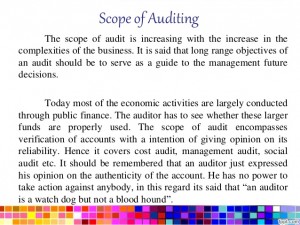Audit Scope mean boundaries of Audit In-other words we can also say that the audit scope means the circle in which the auditor audit the company and maintain relevant information needed for auditing.
Audit Scope:
Scope of Audit can explain with the following points.

Scope of Audit:
1. Legal Requirement:
The auditor can determine the scope of financial statement in accordance with the requirement of legislation, regulation or relevant professional bodies the auditor can follow all the rules applicable on the audit work while check in the accounts of a business concern.
2. Reasonable Assurance:
The auditor should obtain reasonable assurance that information contained underlying accounting records is the basis of preparing financial statement.
You May also like to Read
3. Audit of all aspect of entity:
Many area of the audit should be recognized to cover all aspects of the entity as for as they are relevant with financial statement being audited. He has to check all department s in which cash is involved.
4. Reasonable Financial Information:
The auditor accesses that information contained in the accounting records and other relevant data is sufficient .he carries out other tests enquirers and other verification procedures of accounting transactions and account balances as considers appropriate.
5. Comparison of Financial Statement:
The auditor determines whether the relevant information is properly communicated .He compares the financial statements with the underlying financial records and other sources of data. He checks whether they properly summarized the transactions and events therein.
6. Errors Indication:
The auditor should extend procedure or dispel his suspicion. It is the duty of an auditor to check cent percent items. He must try to discover the errors in accounting books and other records.
7. Management Judgment:
The auditor determines whether the relevant information is properly communicated. He considers judgment that the management has made in preparing the financial statements
8. Reliable Information:
The auditor should obtain reasonable assurance as to whether the information contained in the underlying accounting record and other source data is reliable and sufficient as the basis for preparation of the financial statements.
The auditor can use various techniques to test the validity of data. All auditors while doing the auditor work usually apply the compliance test and substance test. The auditor can show such information in the report.
9. Test:
The auditing assesses the reliability and sufficiency of the information contained in the underlying accounting record and other source data by carrying out other tests, enquirers and other verification procedures of accounting transaction and account balance as he considers appropriate in the particular circumstances.
There are compliance test and substantive test in order to examine the date. The vouching, verification and valuation technique are also used.
10. Appropriate Reporting
An appropriate reporting to the concerned persons to explain whether the statements of accounts examined do reveal a true and fair view of the state of affairs and of the profit and loss of the organization.
Audit Scope limitation:
Final Word about Audit Scope:
We conclude scope of audit from the above mention points that the circle in which the auditor audit the company and reveal fair view of the companies profit make appropriate report to.
Downloads: